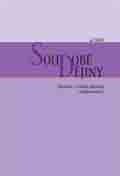Pojem totalitarismu v proměnách dvacátého století
The Changing Concept of Totalitarianism in the Course of the Twentieth Century
Author(s): Clemens VollnhalsSubject(s): History
Published by: AV ČR - Akademie věd České republiky - Ústav pro soudobé dějiny
Summary/Abstract: The term ‘totalitarianism’ was coined in Italy by members of the opposition to Mussolini’s Fascist dictatorship. It was used as a catchword in order to point out the novel nature of that dictatorship. A second line of tradition, aiming at conceptualizing the term, was a consequence of Social Democratic forces in Germany taking issue with Lenin’s Bolshevist dictatorship. From the mid-1930s onwards, the term came to be used in comparative analyses of Fascism, National Socialism, and Communism. The classical definition of the concept of totalitarianism was then proposed by Carl Joachim Friedrich, who drew up a list of criteria in 1953. Hannah Arendt, by contrast, offered a rather historicalphilosophical approach. Both explanations consider mass terror to be a central factor, which means that, strictly speaking, developments in the Soviet Union after Stalin’s death are not covered by the term. More recent definitions, however, emphasize the absolute pre-eminence of politics and total control as principal features of totalitarian rule. This makes it possible to distinguish between modern dictatorships based on ideology and authoritarian dictatorships.
Journal: Soudobé Dějiny
- Issue Year: XVI/2009
- Issue No: 04
- Page Range: 625-639
- Page Count: 15
- Language: Czech

